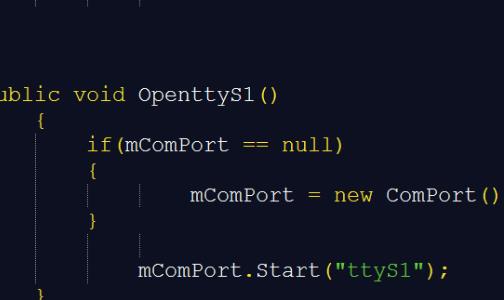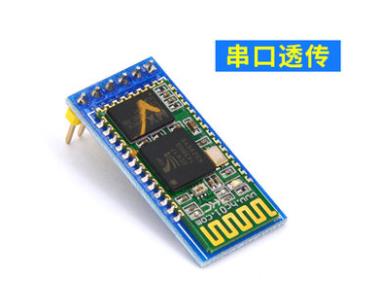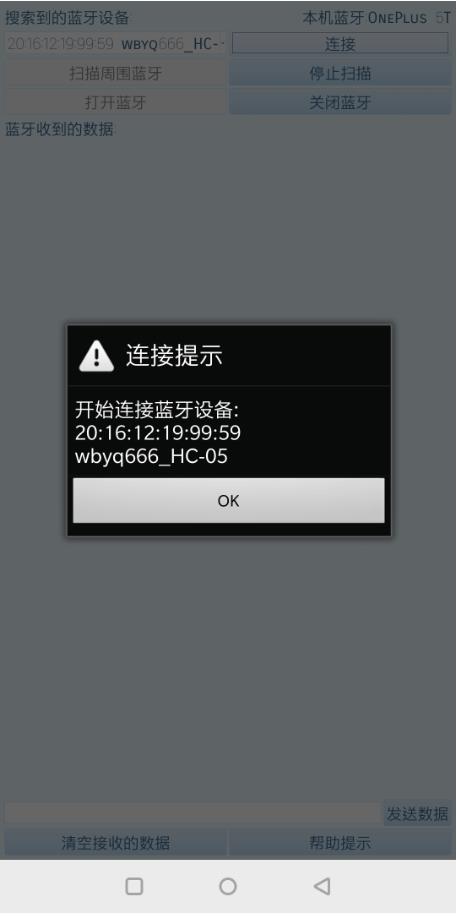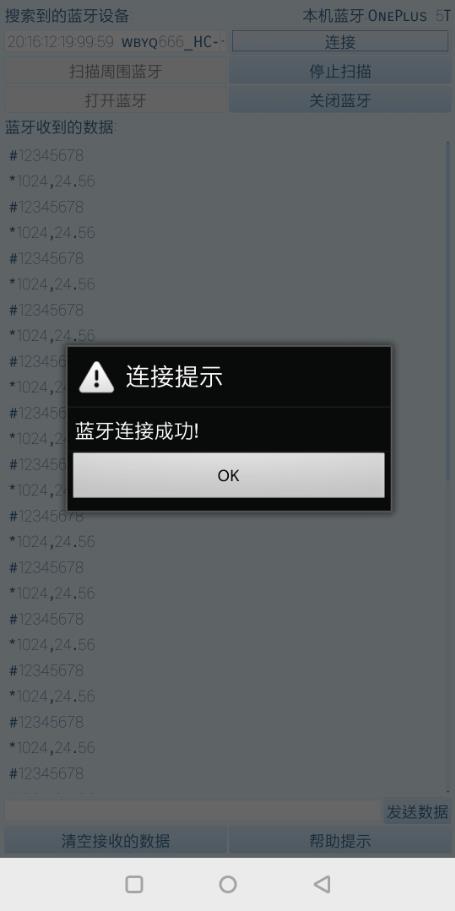Android studio蓝牙app的串口是啥
Posted
tags:
篇首语:本文由小常识网(cha138.com)小编为大家整理,主要介绍了Android studio蓝牙app的串口是啥相关的知识,希望对你有一定的参考价值。
参考技术AAndroidstudio蓝牙app的串口是一种通信的方式。类似于USB只是比USB低级多了,但是手机等设备他没外置这个串口,解决方式就是手机用蓝牙连接一个小硬件,小硬件有个串口他的和单片机连接,来达到手机和单片机的串口连接这种方式就是蓝牙串口。

Androidstudio蓝牙app的串口特点
蓝牙串口是基于SPP协议SerialPortProfile,能在蓝牙设备之间创建串口进行数据传输的一种设备,蓝牙串口的目的是针对如何在两个不同设备通信的两端上的应用之间保证一条完整的通信路径,需要在系统设置里连接上HC05的蓝牙,默认配对密码为1234默认波特率为9600。
默认名为HC05最好在连接后再看一下对应的MAC地址,因为我做的是单一连接单片机同一时间只能接入一个蓝牙设备,所以需求对更改连接蓝牙模块需求要求不大,如果用户不在创建项目时更改设备MAC地址,则使用的就是默认的MAC地址所以也没有做选择蓝牙设备的模块。
QT应用编程: 编写HC05串口蓝牙调试助手(Android系统APP)
一、环境介绍
QT版本: 5.12.6
编译环境: win10 64位
目标系统: Android
完整工程源码下载地址(包含APK文件): https://download.csdn.net/download/xiaolong1126626497/19051787
想学习QT的Android环境搭建看这里(win10版本): https://blog.csdn.net/xiaolong1126626497/article/details/117254453
(ubuntu版本): https://blog.csdn.net/xiaolong1126626497/article/details/117256660
想学习QT入门到精通编程的看这里:https://blog.csdn.net/xiaolong1126626497/article/details/116485145
二、功能介绍
设计本软件的目的是作为HC05/06系列蓝牙串口的调试助手,方便嵌入式工程师、电子工程师调试蓝牙串口模块,HC05/06是经典的2.0串口蓝牙模块。



三、软件核心源码
#include "mainwindow.h"
#include "ui_mainwindow.h"
/*
* 设置QT界面的样式
*/
void MainWindow::SetStyle(const QString &qssFile) {
QFile file(qssFile);
if (file.open(QFile::ReadOnly)) {
QString qss = QLatin1String(file.readAll());
qApp->setStyleSheet(qss);
QString PaletteColor = qss.mid(20,7);
qApp->setPalette(QPalette(QColor(PaletteColor)));
file.close();
}
else
{
qApp->setStyleSheet("");
}
}
static const QLatin1String serviceUuid("00001101-0000-1000-8000-00805F9B34FB");
//这个字符串里面的内容就是串口模式的Uuid
MainWindow::MainWindow(QWidget *parent) :
QMainWindow(parent),
ui(new Ui::MainWindow)
{
ui->setupUi(this);
this->SetStyle(":/qss/blue.css"); //设置样式表
this->setWindowTitle("HC05蓝牙调试助手"); //设置标题
this->setWindowIcon(QIcon(":/wbyq.ico")); //设置图标
/*1. 实例化蓝牙相关的对象*/
discoveryAgent = new QBluetoothDeviceDiscoveryAgent();
localDevice = new QBluetoothLocalDevice();
socket = new QBluetoothSocket(QBluetoothServiceInfo::RfcommProtocol);
//RfcommProtocol表示该服务使用RFCOMM套接字协议。RfcommProtocol属于模拟RS232模式,就叫串口模式
/*2. 关联蓝牙设备相关的信号*/
/*2.1 关联发现设备的槽函数,当扫描发现周围的蓝牙设备时,会发出deviceDiscovered信号*/
connect(discoveryAgent,
SIGNAL(deviceDiscovered(QBluetoothDeviceInfo)),
this,
SLOT(addBlueToothDevicesToList(QBluetoothDeviceInfo))
);
//蓝牙有数据可读
connect(socket,
SIGNAL(readyRead()),
this,
SLOT(readBluetoothDataEvent())
);
//蓝牙连接建立成功
connect(socket,
SIGNAL(connected()),
this,
SLOT(bluetoothConnectedEvent())
);
//蓝牙断开连接
connect(socket,
SIGNAL(disconnected()),
this,
SLOT(bluetoothDisconnectedEvent())
);
//蓝牙连接错误
connect(socket, static_cast<void(QBluetoothSocket::*)(QBluetoothSocket::SocketError)>(&QBluetoothSocket::error),
[=](QBluetoothSocket::SocketError error)
{
ui->plainTextEdit_BluetoothInfiShow->insertPlainText(socket->errorString()); //显示错误信息
if(QBluetoothSocket::UnknownSocketError ==error)
{
ui->plainTextEdit_BluetoothInfiShow->insertPlainText("位置错误\\n"); //显示错误信息
}
if(QBluetoothSocket::NoSocketError ==error)
{
ui->plainTextEdit_BluetoothInfiShow->insertPlainText(" 没有错误 用于测试\\n"); //显示错误信息
}
if(QBluetoothSocket::HostNotFoundError ==error)
{
ui->plainTextEdit_BluetoothInfiShow->insertPlainText("找不到远程主机\\n"); //显示错误信息
}
if(QBluetoothSocket::ServiceNotFoundError ==error)
{
ui->plainTextEdit_BluetoothInfiShow->insertPlainText(" 无法在远程主机上找到服务UUID\\n"); //显示错误信息
}
if(QBluetoothSocket::NetworkError ==error)
{
ui->plainTextEdit_BluetoothInfiShow->insertPlainText("尝试从套接字读取或写入返回错误\\n"); //显示错误信息
}
if(QBluetoothSocket::UnsupportedProtocolError ==error)
{
ui->plainTextEdit_BluetoothInfiShow->insertPlainText(" 该平台不支持该协议\\n"); //显示错误信息
}
if(QBluetoothSocket::OperationError ==error)
{
ui->plainTextEdit_BluetoothInfiShow->insertPlainText("当套接字处于不允许的状态时尝试进行操作\\n"); //显示错误信息
}
});
/*3. 检查蓝牙的状态,用于设置按钮的初始状态*/
/*3.1 检查蓝牙是否开启*/
if(localDevice->hostMode() == QBluetoothLocalDevice::HostPoweredOff)
{
//如果蓝牙处于关闭状态
ui->pushButton_OpenBluetooth->setEnabled(true); //打开按钮
ui->pushButton_CloseBluetooth->setEnabled(false); //关闭按钮
ui->pushButton_BluetoothScan->setEnabled(false);
}
else //如果蓝牙处于开启状态
{
ui->pushButton_OpenBluetooth->setEnabled(false);//打开按钮
ui->pushButton_CloseBluetooth->setEnabled(true);//关闭按钮
ui->pushButton_BluetoothScan->setEnabled(true); //设置扫描按钮可用
}
/*3.2 设置标签显示本地蓝牙的名称*/
QString name_info("本机蓝牙:");
name_info+=localDevice->name();
ui->label_BluetoothName->setText(name_info);
ui->pushButton_StopScan->setEnabled(false); //设置停止扫描蓝牙的按钮不可用
ui->plainTextEdit_BluetoothInfiShow->setEnabled(false); //设置不可编辑
}
MainWindow::~MainWindow()
{
delete ui;
delete discoveryAgent;
delete localDevice;
delete socket;
}
void MainWindow::on_pushButton_OpenBluetooth_clicked()
{
/*请求打开蓝牙设备*/
localDevice->powerOn();
ui->pushButton_OpenBluetooth->setEnabled(false);//打开按钮
ui->pushButton_CloseBluetooth->setEnabled(true);//关闭按钮
ui->pushButton_BluetoothScan->setEnabled(true); //设置扫描按钮可用
ui->pushButton_StopScan->setEnabled(true);
}
void MainWindow::on_pushButton_CloseBluetooth_clicked()
{
/*关闭蓝牙设备*/
localDevice->setHostMode(QBluetoothLocalDevice::HostPoweredOff);
ui->pushButton_OpenBluetooth->setEnabled(true);//打开按钮
ui->pushButton_CloseBluetooth->setEnabled(false);//关闭按钮
ui->pushButton_BluetoothScan->setEnabled(false); //设置扫描按钮不可用
ui->pushButton_StopScan->setEnabled(false);
}
void MainWindow::on_pushButton_BluetoothScan_clicked()
{
/*开始扫描周围的蓝牙设备*/
discoveryAgent->start();
ui->comboBox_BluetoothDevice->clear(); //清除条目
ui->pushButton_BluetoothScan->setEnabled(false); //设置扫描按钮不可用
ui->pushButton_StopScan->setEnabled(true); //设置停止扫描按钮可用
}
void MainWindow::on_pushButton_StopScan_clicked()
{
/*停止扫描周围的蓝牙设备*/
discoveryAgent->stop();
ui->pushButton_StopScan->setEnabled(false); //设置停止扫描按钮不可用
ui->pushButton_BluetoothScan->setEnabled(true); //设置扫描按钮可用
}
/*当扫描到周围的设备时会调用当前的槽函数*/
void MainWindow::addBlueToothDevicesToList(const QBluetoothDeviceInfo &info)
{
// QString label = QString("%1 %2").arg(info.name()).arg(info.address().toString());
QString label = QString("%1 %2").arg(info.address().toString()).arg(info.name());
ui->comboBox_BluetoothDevice->addItem(label); //添加字符串到comboBox上
}
//有数据可读
void MainWindow::readBluetoothDataEvent()
{
QByteArray all = socket->readAll();
ui->plainTextEdit_BluetoothInfiShow->insertPlainText(QString::fromLocal8Bit(all));
}
//建立连接
void MainWindow::bluetoothConnectedEvent()
{
QMessageBox::information(this,tr("连接提示"),"蓝牙连接成功!");
/*停止扫描周围的蓝牙设备*/
discoveryAgent->stop();
ui->pushButton_StopScan->setEnabled(false); //设置停止扫描按钮不可用
ui->pushButton_BluetoothScan->setEnabled(false); //设置扫描按钮不可用
}
//断开连接
void MainWindow::bluetoothDisconnectedEvent()
{
QMessageBox::information(this,tr("连接提示"),"蓝牙断开连接!");
ui->pushButton_BluetoothScan->setEnabled(true); //设置扫描按钮可用
}
/*
在说蓝牙设备连接之前,不得不提一个非常重要的概念,就是蓝牙的Uuid,引用一下百度的:
在蓝牙中,每个服务和服务属性都唯一地由"全球唯一标识符" (UUID)来校验。
正如它的名字所暗示的,每一个这样的标识符都要在时空上保证唯一。
UUID类可表现为短整形(16或32位)和长整形(128位)UUID。
他提供了分别利用String和16位或32位数值来创建类的构造函数,提供了一个可以比较两个UUID(如果两个都是128位)的方法,还有一个可以转换一个UUID为一个字符串的方法。
UUID实例是不可改变的(immutable),只有被UUID标示的服务可以被发现。
在Linux下你用一个命令uuidgen -t可以生成一个UUID值;
在Windows下则执行命令uuidgen 。UUID看起来就像如下的这个形式:2d266186-01fb-47c2-8d9f-10b8ec891363。当使用生成的UUID去创建一个UUID对象,你可以去掉连字符。
*/
//发送数据
void MainWindow::on_pushButton_SendData_clicked()
{
QString text=ui->lineEdit_SendData->text();
QByteArray send_data=text.toLocal8Bit();
socket->write(send_data); //发送数据
}
//清空收到的数据
void MainWindow::on_pushButton_Clear_clicked()
{
ui->plainTextEdit_BluetoothInfiShow->setPlainText("");
}
//连接蓝牙
void MainWindow::on_pushButton_ConnectDev_clicked()
{
QString text = ui->comboBox_BluetoothDevice->currentText();
int index = text.indexOf(' ');
if(index == -1) return;
QBluetoothAddress address(text.left(index));
QString connect_device="开始连接蓝牙设备:\\n";
connect_device+=ui->comboBox_BluetoothDevice->currentText();
QMessageBox::information(this,tr("连接提示"),connect_device);
//开始连接蓝牙设备
socket->connectToService(address, QBluetoothUuid(serviceUuid) ,QIODevice::ReadWrite);
}
//帮助提示
void MainWindow::on_pushButton_help_clicked()
{
QMessageBox::information(this,tr("帮助提示"),"本软件用于HC-05/06系列串口蓝牙调试!\\n"
"不支持BLE4.0版本蓝牙调试!\\n"
"软件作者:DS小龙哥\\n"
"BUG反馈:1126626497@qq.com");
}

以上是关于Android studio蓝牙app的串口是啥的主要内容,如果未能解决你的问题,请参考以下文章
QT应用编程: 编写HC05串口蓝牙调试助手(Android系统APP)